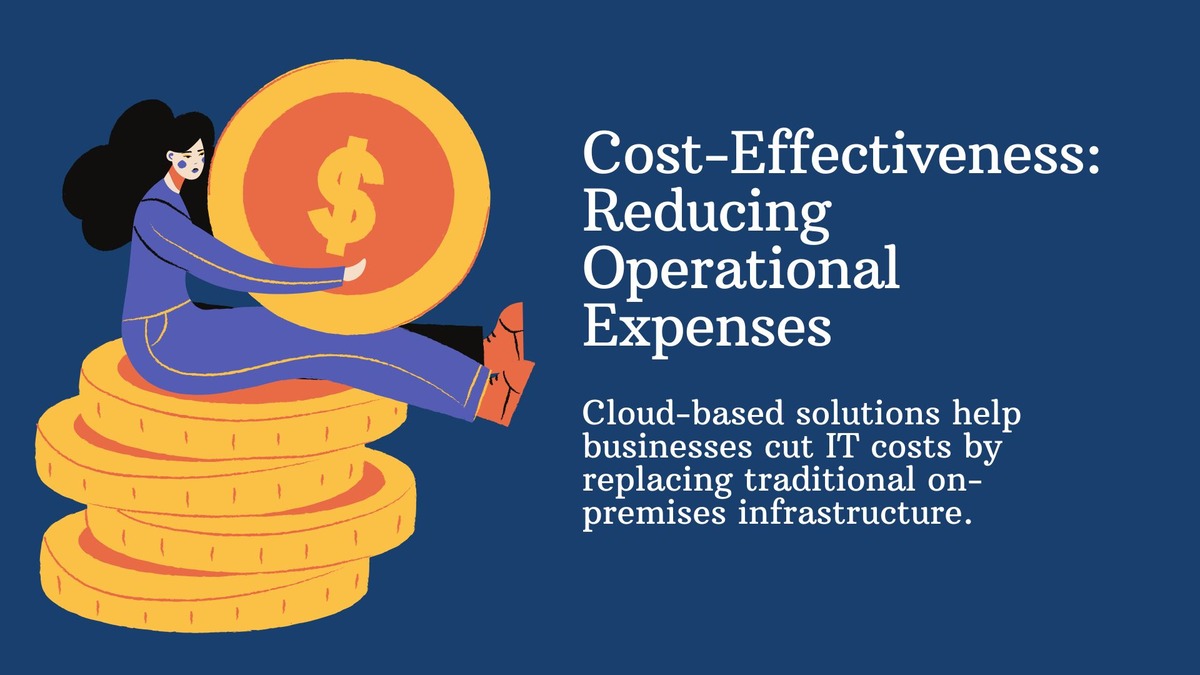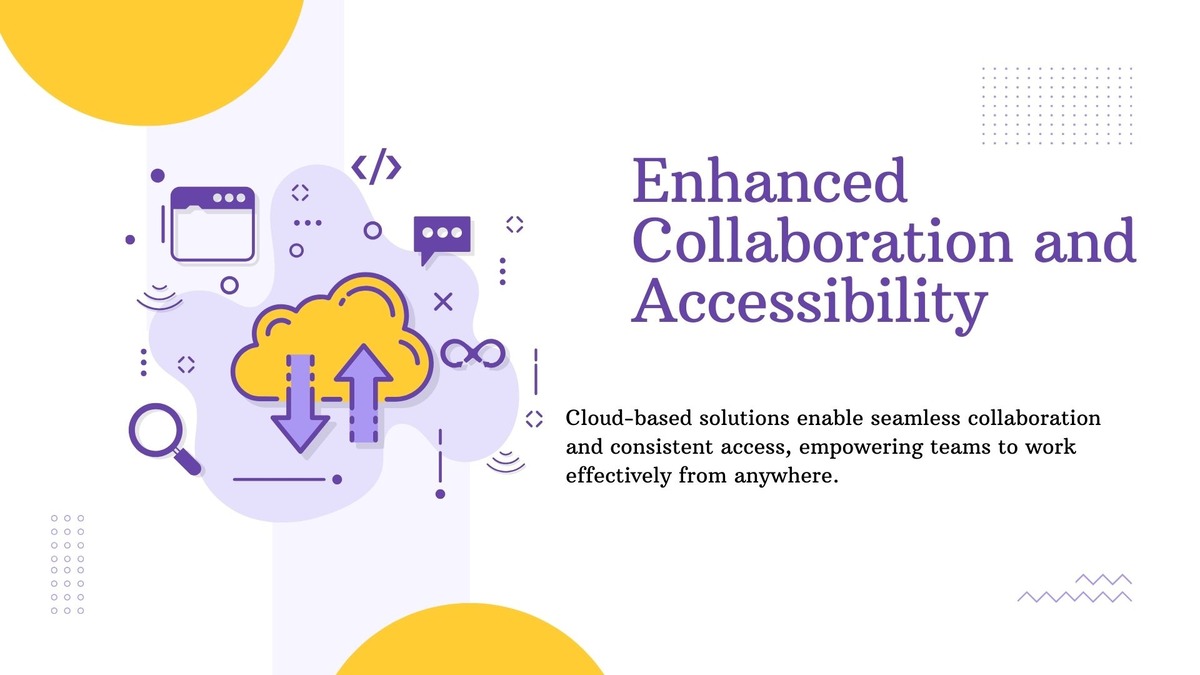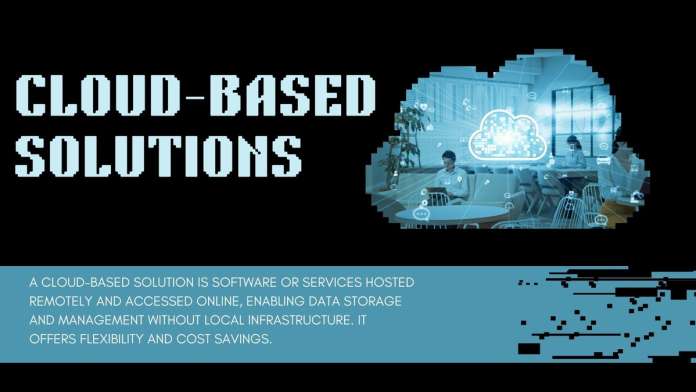In today’s fast-paced digital landscape, cloud-based solutions have become a game-changer for businesses of all sizes. But what exactly are cloud-based solutions, and why are they gaining so much traction?
Advantages of Cloud-Based Solution
At its core, a cloud-based solution refers to any service, application, or resource that is hosted on the internet, rather than on a local server or computer. This can include anything from data storage and software applications to entire IT infrastructures. The main advantage is that you access these resources via the internet, usually through a web browser, making them incredibly versatile and easy to use.
-
Streamlining Operations
One of the biggest appeals of cloud-based solutions is their ability to streamline operations. They eliminate the need for heavy investment in physical hardware, which means businesses can focus more on growth and less on maintaining complex IT systems. Companies can easily rent server space and computing power from cloud providers, paying only for what they use.
-
Flexibility and Agility
Moreover, the flexibility and agility offered by cloud-based solutions make them indispensable for modern business environments. Teams can collaborate in real-time from anywhere in the world, breaking down geographical barriers and fostering a more dynamic work culture. This accessibility also provides significant advantages when it comes to remote work, which has become the norm in today’s global landscape.
In summary, cloud-based solutions offer an efficient, cost-effective, and scalable way to manage business operations, making them an essential tool for staying competitive in today’s market.
Cost-Effectiveness: Reducing Operational Expenses

When it comes to managing operational costs, cloud-based solutions offer a compelling advantage for businesses of all sizes. By shifting from traditional on-premises infrastructure to the cloud, companies can significantly reduce their IT expenses. Here’s how:
-
Pay-As-You-Go Model
Firstly, cloud services typically operate on a pay-as-you-go model. This means businesses only pay for the resources they actually use, eliminating the need for upfront capital expenditure on hardware and software. This flexible pricing structure is particularly advantageous for startups and small-to-medium enterprises (SMEs) that may not have the financial muscle for large, initial investments.
-
Reduced Maintenance Costs
Secondly, the maintenance and management of physical servers are no longer your burden when using cloud services. Cloud providers take care of regular updates, patches, and security measures, which translates to fewer in-house IT staff required on payroll. For many businesses, this can mean considerable savings on labor costs and the elimination of unforeseen expenses related to IT emergencies.
-
Lower Energy Expenses
Moreover, energy costs associated with running and cooling servers are passed on to the cloud provider. Given the increasingly green policies adopted by major cloud providers, such as Google Cloud and Microsoft Azure, this also contributes to sustainability efforts, which can be a secondary benefit for companies aiming to reduce their carbon footprint.
In summary, the move to cloud-based solutions offers a cost-effective strategy for reducing operational expenses. By adopting a cloud-first approach, businesses can not only save money but also allocate resources more efficiently, allowing for investment in innovation and growth.
Scalability: Tailoring Resources to Business Needs

One of the standout advantages of cloud-based solutions is scalability. Imagine running a business that suddenly experiences a surge in customer demand. Traditional IT systems might buckle under the pressure, but cloud services flex to meet your needs seamlessly.
-
Real-Time Resource Adjustment
Scalability allows businesses to adjust their resources in real-time, providing precisely what they need when they need it. Whether you’re launching a new product, experiencing seasonal sales bursts, or expanding your operations, cloud-based platforms can effortlessly scale up or down. This flexibility ensures optimal performance without the worry of infrastructure limitations.
-
Cost-Effective Solutions
By adopting cloud technology, you can avoid the financial strain of investing in additional hardware or software that might not be consistently utilized. Instead, you pay only for the resources you use, which can lead to significant cost savings. This pay-as-you-go model is particularly advantageous for startups and smaller companies that need to manage their cash flow judiciously.
-
Support for Rapid Innovation
Moreover, cloud scalability supports rapid innovation. Being able to test new applications and services quickly without investing heavily upfront allows businesses to adapt and evolve in a competitive marketplace. This agility can be the difference between staying ahead of competitors or falling behind.
In summary, the scalable nature of cloud-based solutions ensures that businesses can grow without the logistical and financial headaches often associated with traditional IT infrastructures. This makes cloud technology an invaluable tool for businesses of all sizes and industries.
Enhanced Collaboration and Accessibility

In today’s fast-paced business environment, seamless collaboration and consistent accessibility are crucial for success. Cloud-based solutions shine in these areas, offering tools that empower teams to work together more effectively, no matter where they are located.
-
Real-Time Collaboration
One of the standout features of cloud-based platforms is real-time collaboration. Teams can edit documents, share files, and communicate effortlessly using tools like Google Workspace or Microsoft 365. Gone are the days of sending multiple email attachments and dealing with confusing version control. With cloud-based solutions, all team members can access the latest updates instantly, ensuring everyone stays on the same page.
-
Enhanced Accessibility
Accessibility is another major advantage. Cloud solutions break down the barriers of location and device. Whether you’re working from the office, home, or halfway around the globe, you can access your important files and applications as long as you’re connected to the internet. This flexibility doesn’t just enhance employee satisfaction; it also boosts productivity. When your workforce isn’t tied to a specific location, they can respond to business needs more swiftly and effectively.
-
Mobile Support
Moreover, cloud-based tools often come with built-in mobile support. Employees can tap into their workspace from smartphones or tablets, making it easier to manage tasks on the go. This level of connectivity is invaluable for businesses with remote workers or those that require frequent travel.
In summary, cloud-based solutions offer a robust platform for enhanced collaboration and accessibility. They break down traditional workspace barriers, making it easier for teams to work together seamlessly and efficiently, regardless of their physical location.
Robust Security Measures

One of the standout benefits of cloud-based solutions is the robust security measures they offer. In today’s digital age, cybersecurity is a top concern for businesses of all sizes. Traditional on-premises IT infrastructure often struggles to keep up with the fast-evolving landscape of cyber threats. Conversely, leading cloud providers invest heavily in advanced security technologies and practices to protect your data.
-
Data Encryption
Cloud solutions offer multiple layers of security, starting with data encryption. This ensures that your data is unreadable to unauthorized users, both when it’s stored and when it’s being transmitted over the internet. Regular security audits and compliance certifications, such as ISO 27001 and GDPR, further guarantee that cloud services meet rigorous international security standards.
-
Advanced Threat Protection
Another key advantage is the deployment of advanced firewalls and antivirus software. These systems constantly monitor network traffic to detect and neutralize suspicious activities in real-time. Additionally, many cloud providers offer tools for threat detection and prevention, often powered by AI, which can identify and mitigate zero-day vulnerabilities faster than traditional methods.
-
Robust Access Controls
Cloud-based solutions also provide robust access controls, allowing businesses to define who can access which resources, from anywhere in the world. Multi-factor authentication (MFA) adds an additional layer of security by requiring more than one method of verification to gain access.
-
Data Recovery and Redundancy
Regular backups and redundancy measures offered by cloud solutions ensure that even in the event of a cyberattack, your data remains safe and recoverable. Hosting data in multiple geographic locations also provides a fail-safe against data loss due to localized issues.
By leveraging these comprehensive security features, businesses can significantly reduce risks, secure sensitive data, and focus more on growth and innovation, rather than getting bogged down by security challenges.
Boosting Business Continuity and Disaster Recovery

In today’s fast-paced business environment, maintaining operations during unexpected disruptions is crucial. Cloud-based solutions play a vital role in ensuring business continuity and effective disaster recovery plans.
-
Automatic Data Backup
One of the primary advantages of cloud solutions is automatic data backup. Unlike traditional on-premises systems, cloud servers regularly create copies of your data and store them in multiple locations. This redundancy ensures that even if one server fails, your data remains safe and accessible. By eliminating the dependence on physical hardware, businesses can avoid the risk of data loss due to hardware malfunctions or site-specific disasters.
-
Minimizing Downtime
Downtime can be extremely costly, not just in terms of revenue loss, but also in reputation. Cloud providers offer robust disaster recovery options that enable businesses to quickly restore functions with minimal downtime. With cloud solutions, you can automate your recovery processes to switch operations to a secondary site or system seamlessly, ensuring your business keeps running even during a crisis.
-
Compliance and Security
Moreover, cloud services often come with built-in compliance and security features that aid in meeting industry-specific regulations. This means your disaster recovery plans align with legal requirements, offering an additional layer of protection and peace of mind.
-
Enhanced Accessibility
Another key aspect is accessibility. Being able to access your systems and data from any location is especially beneficial during a disaster. Employees can work remotely while still having full access to the necessary tools and information, ensuring uninterrupted productivity.
In summary, cloud-based solutions offer an improved continuity and disaster recovery strategy by providing automatic backups, minimizing downtime, ensuring compliance, and enhancing accessibility. By leveraging these features, businesses can not only safeguard their data but also ensure they bounce back swiftly from any disruption.
Read More: Top 10 Popular SaaS Marketing Blogs in 2024

